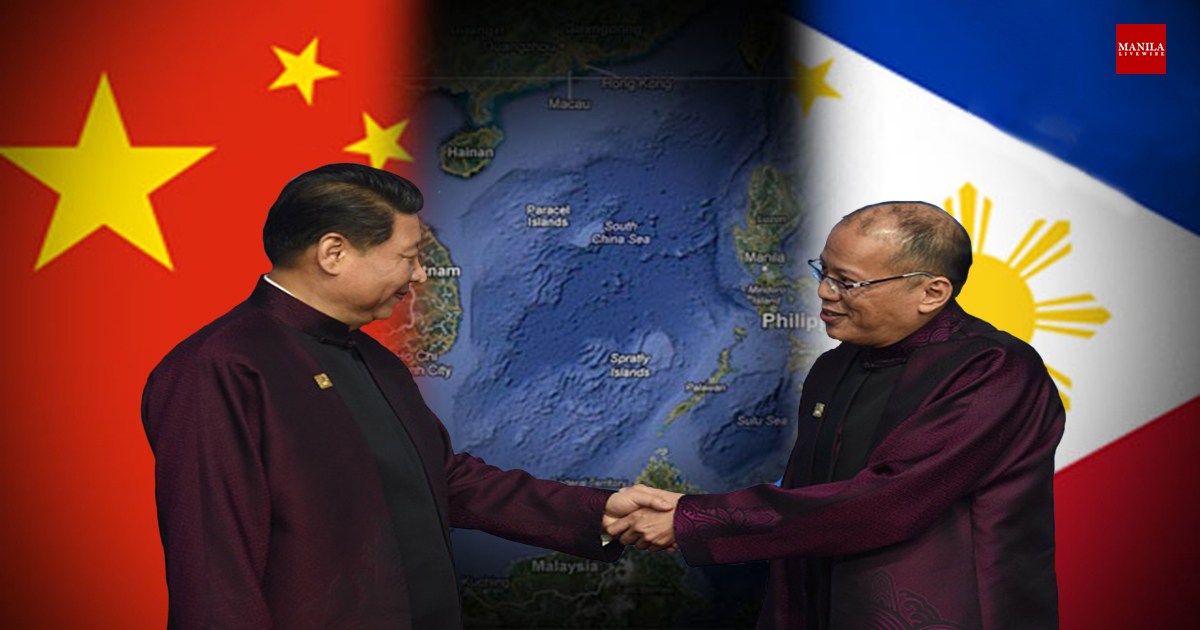It seems that the page you requested is not yet propagated on the server.
Please comeback later or browse recent articles below:
Watch this video of the SWINCAR electric off-road vehicle. It’s unique pendular suspension system allows it to effortlessly take terrain that other vehicles couldn’t traverse. Available in both two wheel and four wheel drive, with a single-seat version available for order and a two-seat version available to order starting in ...
Chinese Foreign and Defense Ministries reacted to a report of Japan supplying patrol planes to the Philippines that would be used to monitor activities in the West Philippine Sea or South China Sea.
[caption id="attachment_5533" align="alignleft" width="150"] Chinese Foreign Ministry[/caption]
This was in response to a Reuters report referred to a four anonymous sources as saying that Tokyo wants to give three Beechcraft TC-90 King Air planes outfitted with surface and air reconnaissance radar to the Philippines, however Manila allegedly favored a more advanced aircraft, the Lockheed Martin P3-C Orion, which may have the capability to track China's submarine activity.
The United States had requested and asked Japan to give training programs and maintenance support to any planes it gives the Philippines, a US military source told Reuters.
The Information Office of the Ministry of National Defense told China Daily in a written response."China hopes that the military cooperation by relevant countries contributes to the peace and stabilization of the region and not the contrary,"
The Spokesperson's Office of the Foreign Ministry stated that China hopes to see the parties involved do more to contribute to "improving the mutual trust among countries in the region".
Image credit to Gerald Helmer
By: Carl ...
Japan is willing to give a surveillance plane that the Philippines could use for patrols in the South China Sea, sources said, a move that would develop Tokyo's security ties with the Southeast Asian country most inconsistent with Beijing over the disputed region
A three units of Beechcraft TC-90 King Air plane that could be fitted with fundamental surface and air observation radar.
They said talks inside of the Japanese government were preparatory and would need to overcome legitimate obstacles. Japan had yet to formally propose the planes as a different option for more complex Lockheed Martin P3-C aircraft that Manila needs to track Chinese submarine activity, they included.
Senior Philippine military and defense official in Manila said they had not heard in regards to the conceivable gift of the twin-turboprop TC-90 aircraft, which Japan uses to prepare and train military pilots.
Philippine President Benigno Aquino III and Prime Minister Shinzo Abe has ink an understanding that will exchange defense technology and equipment that could help the Philippine’s beef up patrols in areas of the West Philippine Sea also claimed by China.
[su_slider source="media: 5528,5527" title="no" speed="1000"]
"The Philippines doesn't have enough aircraft to conduct regular patrols over the South China Sea," one of the sources in Japan said, declining to be identified because he was not authorised to talk to the media.
Giving airplane, even little planes, would speak to a military upgrade for the Philippines, which has only a handful of fixed-wing planes it can deploy on maritime patrols.
Equipping Manila with maritime-capable patrol planes would dovetail with Prime Minister Shinzo Abe's more solid security motivation however likely outrage and anger China, which has over and over blamed Japan for meddling in the South China Sea disputes.
Featured image credit to chofu spotter - Arla H. Kanzaki
By: ...
Japan has vowed a USD 2-billion loan package for the development and construction of the Philippines' biggest railroad project, the Department of Foreign Affairs said Thursday.
The loan package is reserved for the construction of the first phase of the North-South Commuter Rail (NSCR) Project, a 36.7-kilometer narrow-gauge elevated commuter railway from Malolos, Bulacan to Tutuban, Manila.
[caption id="attachment_5515" align="alignleft" width="150"] DFA Secretary Albert Del Rosario[/caption]
Foreign Affairs Secretary Albert del Rosario met with Japanese foreign minister Minoru Kiuchi on Wednesday on the sidelines of the Asean Ministerial and Related Meetings in Kuala Lumpur, Malaysia. where he received the Official Development Assistance (ODA) pledge.
Japan’s loan aid, takes after the dedication of the Japanese government in firming up its participation and cooperation with the Philippines for the said project as part of both countries "Collaboration Roadmap for Quality Infrastructure Development in the Transport Sector in Metropolitan Manila Area," which was settled after amid President Benigno Aquino III's State Visit. DFA said.
[caption id="attachment_5513" align="alignnone" width="700"] Sec. Albert Del Rosario with Japan Prime Minister Shinzo abe[/caption]
Philippine Transportation authorities would like to start the railway project’s construction in the first quarter of 2017 and end in 2020, the same year it becomes operational.
The train system is expected to transport 340,000 travelers every day.
Japan is the Philippines' top source of ODA. Its help, through credits, grants and technical cooperation covers an extensive variety of areas, including public works, socio-economic infrastructure, agriculture, transportation and communications.
Featured image credit to abc.net
By: ...
In order for the Congress to check and craft additional legislative measures in support for the AFP modernization. House committee on national defense and security chairman and Muntinlupa Congressman Rodolfo G. Biazon asks defense officials on Wednesday to submit defense equipment “wish list”.
Congress will review, and, if necessary, craft legislative measures to support further development of the AFP by revising government procurement laws as well as making amendments to Republic Act 7227, otherwise known as the Bases Conversion and Development Act of 2012.
“We need to see the whole picture of the military’s plans in the long term so we will ask them to submit a modernization plan that will span the whole 15 years plan,” Biazon said, as quoted by BusinessWorld.
The AFP modernization program includes a long list of acquisition plans of military hardware including submarines, multi-role fighter aircraft, missile defense system, frigates and other modern defense technology.
[su_slider source="media: 5499,5504,5503,5502,5501,5500,5497,5498" title="no" speed="1000"]
Possible military defense equipment needed by the Armed Forces of the Philippines
By: ...
The Armed Forces of the Philippines (AFP) requested Congress to design particular rules for the acquisition of defense equipment to determine the bottlenecks in the overhaul of its apparatus coming from existing government procurement laws.
AFP Deputy Chief of Staff for Plans Brig. Gen. Guillermo A. Molina, Jr. told legislators at the first review of the AFP modernization program that the stringent rules of Republic Act 9184 or the Government Procurement Reform Act have slowed the agency off in getting extra military equipment in recent years.
A status report exhibited by the AFP at the hearing showed 30 planned projects under Republic Act 10349 or the Revised AFP Modernization Act signed in 2012, only two are currently being implemented while 28 is still in the stage of procurement.
50% of the projects under the older modernization law, RA 7898 marked and signed 20 years ago, have also yet to be implemented.
Department of National Defense (DND) Asst. Secretary Patrick Velez added that, "RA 9184 appears to be not to be completely responsive of the needs of the AFP."
The delay and slowdown in the upgrade of defense articles and contraptions happen even as P82.48 billion has been assigned allocated for the AFP modernization program.
With suppliers of defense equipment finding the guidelines set by the procurement law “impossible” to meet, Velez asked Congress to either alter and amend the nation's procurement law to address particular issues defense purchases.
One of the changes that the AFP proposed is the extension of the 30-day period for bid submissions since it has proven to be realistic. Velez said the procurement of defense equipment usually takes a longer time since it is sourced overseas.
In addition, the preference for lowest calculated bids and local producers should be relaxed since the highly advanced systems available abroad can be tailor-fit to meet specific requirements.
Velez said it might also be better if a separate procurement entity for defense agencies or uniformed personnel services be established since the recent trend in defense procurement remove the responsibility of purchasing equipment from the armed forces.
“That would now result to professionalization of defense procurement and correct certain deficiencies,” he said.
[su_slider source="media: 5491,5492" title="no" speed="1000"]
Featured image credit to philstar.com
By: ...
[caption id="attachment_5473" align="alignleft" width="150"] Zhang Hongzhou,[/caption]
China is building and equipping a South China Sea fishing fleet for its maritime militia, with more armed fishing boats bolstering its muscle in the disputed South China Sea, a specialist told a meeting at the Center for Naval Analyses (CNA) Wednesday.
Equipped with armed civilian fishing boats, China's maritime militia is one of the less understudied agencies in the exercise of Chinese maritime power – ordinarily utilizes regular citizen and a civilian fishing vessels for a scope of missions from saving stranded vessels to conducting controversial island landings. While voices in China have since a long time ago called for their inclusion in activities, this would be the first time that the militia would get its own fishing fleet, a help for the world's producer and exporter of fish and consumer of seafood.
"It creates the impression that China is building a state-owned fishing fleet for its maritime militia force in the South China Sea," Zhang Hongzhou, partner research kindred at Singapore's Rajaratnam School of International Studies, told a crowd of people at the two-day meeting on Chinese maritime power.
The growing role of the Chinese maritime militia in fishing activities is not so much new. In reality, as early as 2013, during a visit to Tanmen fishing town in Hainan Province, President Xi Jinping told maritime militiamen that they should "not only lead fishing activities, as well as gather maritime data, collect oceanic information and support the construction of islands and reefs" A first line of defense in support of Chinese interests in the South China Sea.
Xi’s speech added momentum to the development of the maritime militia, with numerous coastal cities setting up units and voices calling for more bolster and resources dedicated to preparing and training fishermen to become a militia army and building new vessels.
But the move to build a state-owned fishing fleet for the maritime militia in the South China Sea is “a new phenomenon,” Zhang said. Having their own particular fleet means that China’s maritime militia will no more need to depend on leasing the fishing vessels of fishermen or fishing companies to carry out their activities.
[caption id="attachment_5472" align="alignnone" width="700"] China's maritime militia[/caption]
In Zhang's perspective, the movement by the Chinese government mirrors Beijing's growing frustration about its inability to manage fishermen.After a series of growing problems, including recurrent complaints about low pay for involvement in government initiatives –, for example, securing the Chinese oil rig during the incident with Vietnam last year – the central government has chosen to progressively control and direct its own activities.
“They can’t manage the fishermen,” Zhang said.
As to their motivation, there is little uncertainty in Zhang's perspective that they will be used to consolidate China’s position in the Spratlys.
In addition to the attesting Chinese claims there, the Spratlys are likewise a profitable fishing ground for China, with one government study demonstrating more than 1.8 million tons of fishery resources in waters close to the Spratly Islands, with yearly catch-able sums around 500,000 to 600,000 tons.
"These vessels, obviously, will be sent and deployed in the Spratlys," he said. as cited in a report by the Tokyo-based Diplomat.
In any case, Zhang has likewise been cautioning that the growing use of the maritime militia could actually intensify regional disputes and undermine Chinese interests.
Zhang said that maritime militia could utilize patriotism as a spread to embrace unlawful exercises including poaching coral reefs, ocean turtles and other endangered species which risks China's international image. They could likewise carry out brazen operations in disputed waters even going beyond China's nine-dash line, thereby stoking regional tensions and territorial strains with neighboring states.
“This practice risks hijacking China’s foreign policy and undermining relations with neighboring countries,” Zhang wrote.
How China addresses these risks remains to be seen since the specifics of the fleet are still unclear – down to its very size and the timeline of its development. China’s Hainan Province, Zhang noted, has ordered the building of 84 large militia fishing vessels for Sansha City. Ten fishing vessels will be delivered in 2015, and the fleet currently has only four vessels. The full development of the fleet is thus likely to take some time, “It will take some years.”Zhang admitted.
By: ...
Some Facts:
Since December 1972, a series of 37 dynamic tests were conducted on the 180 MM rocket. The project, initiated by President Ferdinand Marcos, also involved testing of other weapons and armaments.
On September 1975, four “bongbong” rockets (named after Marcos’ son, obviously) were successfully launched. Asked about why the country was experimenting in making its own ballistic missiles, President Marcos explained:
“The defense of the Philippines cannot be left to alliance with other countries. We must assume that there will be contingencies where even the United States may not be ready to come to our ...
In 1973, the Philippines already developed a missile system the can prevent incoming typhoon in the country, under the leadership of former President Ferdinand E. Marcos. The program calls the fact that it was "Rain Weather Stimulation and Modernization Program" and is led by Col. Ramon Macabuhay. According to a website bagonglipunan.com
Newspaper transcript above - Weather rockets loaded with silver iodide crystals will soon be fired by the Philippine Air Force at storm clouds approaching the Philippines.
The project is part of the government’s “Rain Stimulation and Weather Moderation Program”, an ambitious plan to precipitate rainfall in drought-stricken areas and dissipate storms before they develop full-blown typhoons.
Col. Ramon Macabuhay, chief of air staff and director of the PAF Rainmaking Project said rockets to be used in the trials are now being readied, so with the aircraft from which the rain-making missiles will be launched or fired.
Macabuhay said firing the could-seeding rockets from a distance will protect the pilot and the aircraft from the hazards and turbulence of storm clouds — in short, eliminate the need of flying the plane right into the teeth of the brewing typhoon.
The rocket is similar to the ground-to-air -missiles used in warfare, but instead of an explosive warhead, it will have a wooden rocket head containing approximately half a pound of silver iodide.
Bonus
Video: AFP Lost Missile Projects and Aircraft ...
In the midst of rising maritime tensions in the South China Sea, the Armed Forces of the Philippines (AFP) said the military can defend and shield the nation if the need emerges.
AFP public affairs chief Col. Noel Detoyato said the Philippines can defend and protect itself regardless of having limited defense capabilities as compared to China and other claimants in the maritime dispute.
"Yes we can. That is our mandate," Detoyato told in a media interview.
Detoyato was referring to a Japanese Ministry of Defense presentation titled "China's Activities in the South China Sea," which demonstrated and showed the Philippines lagging behind China, Vietnam and Malaysia as far as air force and naval capabilities.
[caption id="attachment_5364" align="alignleft" width="300"] Col. Noel Detoyato[/caption]
The report said among the four nations, the Philippines has the minimum number of warships with just 80, while China has 892, Malaysia with 208, and Vietnam has 94.
It likewise demonstrated that among the four claimant countries, only the Philippines has no submarine.
The report likewise uncovered that China towers over the three other claimants with 2,582 units of aircraft. The Philippines just has 26, Vietnam has 97 and Malaysia has 71.
The report said the Philippines' buy of 12 Korean jet fighters FA-50 in 2014, which will be used in service by 2017.
[su_slider source="media: 5367,5368" title="no" speed="1000"]
Featured images credit to pinoy weekly
By: Jason ...
Ella Cruz did it again, her new video has now more than 1.5 million view in just 4 days. No regret that she is the new viral dance queen in the Philippines.
Watch Ella Cruz' first viral dance cover video (Twerk It Like Miley), just in case you ...
In spite of China's protests, the United States and the Philippines will call for a stop to island-building work, military deployments and other forceful activities that bring strains up in the disputed South China Sea in an annual diplomatic meeting in Malaysia, officials said Tuesday.
Beijing has contradicted any notice of the prickly territorial rifts in the meetings of foreign ministers from the Association of Southeast Asian Nations and their Asian and western counterparts. In any case, Washington has said it would require a stop to forceful activities by China and other rival countries to permit a diplomatic solution to a problem that threatens regional stability.
"Philippines would push the US call in the meetings this week, but would not agree to be bound by it unless China and other countries locked in the conflict also do so." Philippines foreign secretary Albert del Rosario said on Tuesday.
“As a means of de-escalating tensions in the region, the Philippines fully supports and will proactively promote the call of the United States on the ‘three halts’ — a halt in reclamation, halt in construction and a halt in aggressive actions that could further heighten tensions,” del Rosario said.
“We have to emphasize, however, that this should not in any way legitimize the status of the features reclaimed by China,” del Rosario said, alluding to huge artificial islands that China began building a year ago on no less than seven disputed reefs.
China, the Philippines and four different governments have wrangled over possession and control of the South China Sea, a resource-rich and busy waterway, in a contention that has flared on and off for quite a long time. Strains flared a year ago when China started work to fabricate artificial islands in the Spratly, in the midst of reasons for alarm the activities could obstruct flexibility of route and overflights in a major transit area for the world’s oil and merchandise.
Washington is not a party to the conflict and has a policy of not taking sides in the territorial row, but says a peaceful resolution of the problem and freedom of navigation in the disputed waters were in the US national interest. China rejects any US involvement.
The disputes have led to deadly confrontations between China and Vietnam, and Washington and governments in the region are worried that boosting military deployments increase the risk of miscalculations and accidental clashes that can spiral out of control.
Chinese authorities say the disputes ought not be talked about in the meetings in Malaysia. Top south-east Asian diplomats will meet their US and Chinese counterparts in the Asean Regional Forum, an annual Asian security gathering, in Kuala Lumpur on Thursday.
[caption id="attachment_5330" align="alignleft" width="300"] US Secretary John Kerry[/caption]
In Washington, US State Department representative Mark Toner said on Monday that secretary of state John Kerry would handle the regional and territorial issues in Malaysia.
“This is a forum in which critical security issues need to be brought up and discussed,” Toner told reporters, adding the US would view as “provocative” any moves to “significantly increase the physical size or functionality of disputed features, or to militarize them.”
By: ...
SEE ALSO:
China Escalator Swallows Child’s Mom
Shanghai man’s leg gets amputated in escalator accident in China
After two consecutive escalator accidents in China, a funny video went viral showing how to prevent escalator accident.
Would you do the same thing? We guess people are more careful when riding the ...
SEE ALSO: China Escalator Swallows Child’s Mom – Report
A cleaner was mopping the escalator rails when he got stuck, the elevator stopped but he was severely injured. His left leg was amputated after the accident. The 35-year-old recent man, who has been identified as Zhang.
The cause of the accident is now being investigated . Another poor maintenance of the escalator, according to the manager of the shopping mall. However, Zhang says the escalator was still in operation before he managed to press the button himself to stop it.
A total of three fatal accidents involving escalators were recorded in China last week, spreading feelings of fear, anxiety and outrage over safety protocols in ...
MANILA, Philippines — Bilateral transactions may not be the best arrangement right now to settle the territorial disputes over the South China Sea, the United States' top strategy creator for East Asia and the Pacific said.
[caption id="attachment_5287" align="alignleft" width="300"] Assistant State Secretary Daniel Russel[/caption]
At a recent conference organized by Washington-based think tank The Center for Strategic and International Studies. Assistant State Secretary Daniel Russel said" I don't know anyone in the region who believes that a negotiated settlement between China and other claimants is attainable in the current atmosphere."
China has long been demanding that it resumes and continues bilateral talks with the Philippines and other claimants over the maritime dispute as it embraces expansive large scale reclamation on contested sea features.
Meanwhile, The Philippines, is seeking arbitration against China before a United Nations tribunal, which is right now pondering on its jurisdiction over the case.
Russel said that while the US doesn't take any position on the claims, it has called for either arrangements, negotiations or arbitration as the two peaceful means to settle the competing claims.
He admitted, however, that immediate and direct talks may not address the various contending claims by China, the Philippines, Myanmar, Malaysia, Taiwan and Vietnam.
Likewise making arrangements troublesome is an "absolutist political position taken by a few petitioners who demand that their own particular claims are 'indisputable' and represent territory—however distant from their shores," Russel said, without specifically citing China.
He said such claims include assertions that the territorial waters were "entrusted to them by ancestors" and vows never to relinquish "one inch."
Russel also sees that if the arbitral tribunal finds it has jurisdiction under the United Nations Convention on the Law of the Sea (UNCLOS) over the Philippines' claims and proceeds deliberating on the merits of the case, its potential ruling can legally bind parties to the row.
By: ...
Watch the replay of the what they call the True Sona of Vice President Jejomar Binay that took place in Indang Cavite (4pm). Most media network didn't broadcast this event.
- Video courtesy of GMA ...




